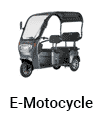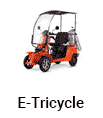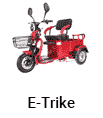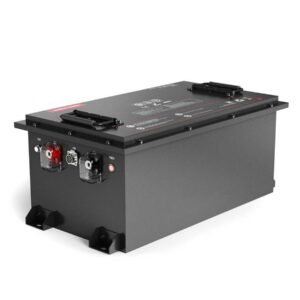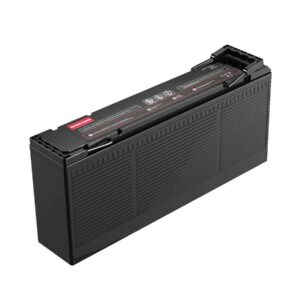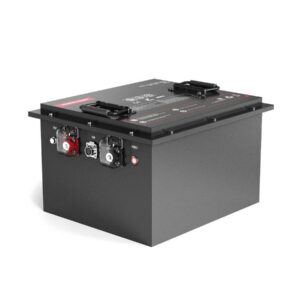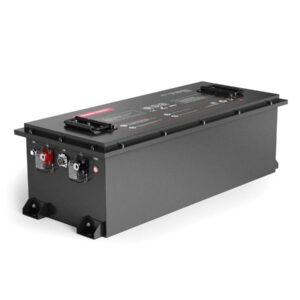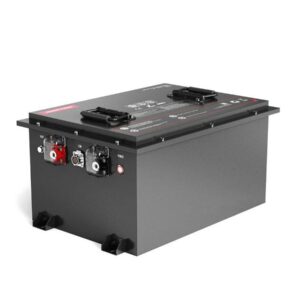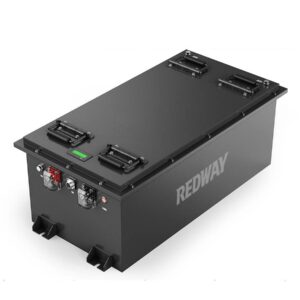Description
Overview
The RG51105P 51.2V 105Ah LiFePO4 Battery provides a reliable, high-performance energy storage solution, ideal for a variety of applications that require consistent power output over long durations. With a nominal energy capacity of 5.37 kWh and robust discharge capabilities, this battery is built to handle demanding conditions while offering long-term reliability and enhanced safety features.
Key Features
- High Energy Capacity: The RG51105P offers 5.37 kWh of energy storage, providing consistent power for a wide range of applications, including electric vehicles, backup systems, and more.
- Long Cycle Life: Capable of more than 5000 cycles at 80% Depth of Discharge (DOD) and a 0.5C discharge rate, this battery offers long-lasting performance and minimizes the need for replacements.
- Peak Discharge Current: This battery can handle peak discharge currents of up to 315A for 30 seconds, making it suitable for high-demand applications such as industrial equipment and electric vehicles.
- Smart BMS Protection: The included Battery Management System (BMS) offers comprehensive protection against overcharge, overdischarge, short-circuit, overheating, and more, ensuring safe operation.
- IP66 Rating: The battery’s IP66 rating ensures it is dust-tight and capable of withstanding powerful water jets, making it suitable for use in harsh environments.
- Wide Temperature Range: Operating in a wide temperature range of -20°C to 65°C for discharging and 0°C to 60°C for charging, this battery can be used in diverse environmental conditions.
- Flexible Configuration: The RG51105P supports parallel connections (up to 4 units) for increased storage capacity, making it ideal for scalable energy systems.
- Advanced Communication: Featuring RS485 communication, this battery can be integrated with various energy management systems, allowing for real-time monitoring and control.
- Optional Upgrades: The RG51105P offers a variety of upgrade options, including Bluetooth, APP control, 4G, GPS, solar MPPT, LCD displays, and more, providing additional monitoring and operational capabilities.
Applications
The RG51105P 51.2V 105Ah LiFePO4 Battery is perfect for a range of energy-intensive applications, including:
- Electric Vehicles (EVs)
- Golf Carts and Sightseeing Cars
- Electric Forklifts
- Energy Storage Systems (ESS)
- Backup Power Systems
- Trolling Motors
- Floor Scrubbers
Product Description
The RG51105P 51.2V 105Ah LiFePO4 Battery is a high-performance lithium-ion battery designed for heavy-duty applications that require high energy storage and reliable power. With a 5.37 kWh capacity, this battery is ideal for industries and vehicles that demand high capacity and consistent output. The unit supports up to 315A peak discharge current, enabling it to handle power surges and ensure smooth operation for power-hungry systems.
The battery features an advanced Smart BMS Protection system, which ensures the battery is protected from common faults, including overcharging, overdischarging, overheating, and short-circuiting. With over 5000 cycles at 80% DOD, the RG51105P provides a long lifespan, offering a 10-year design life and a 3-year warranty. This makes it an excellent investment for both commercial and industrial applications that need reliable and consistent energy storage.
The metal shell design and IP66 rating offer superior protection against environmental hazards, including dust and water exposure, making it suitable for both indoor and outdoor installations. In addition, the battery’s RS485 communication allows it to be easily integrated with various management systems, providing real-time monitoring and improved control over its operation.
Additional Features
- Self-Discharge Rate: The RG51105P has a self-discharge rate of 3% per month, ensuring the battery retains its charge even during long periods of inactivity.
- Power Switch: The power switch allows users to easily isolate the battery from the system, ensuring safety and preventing unwanted discharge when not in use.
- Temperature Protection: With a temperature range from -20°C to 65°C for discharging and 0°C to 60°C for charging, the battery performs reliably in both cold and hot environments.
- Terminal Type: The M8 terminal type ensures secure and safe connections for both power and communication, making installation easier and more reliable.
- Certifications: The RG51105P is compliant with international standards, including UL 1642, IEC 62619, CE, MSDS, and UN38.3, ensuring its safety and quality for various applications worldwide.
Why Choose the RG51105P 51.2V 105Ah LiFePO4 Battery?
The RG51105P 51.2V 105Ah LiFePO4 Battery is a powerful and durable solution for users seeking reliable energy storage in demanding environments. With a high energy capacity, long cycle life, and comprehensive protection features, it is suitable for both commercial and industrial applications that require long-lasting and safe power storage. Its flexible configuration options and wide temperature tolerance make it a versatile choice for a variety of industries, ensuring your energy needs are met efficiently and securely.
Battery Specifications and Performance
What is the maximum continuous discharge current?
The maximum continuous discharge current for LiFePO4 batteries is typically around 250A. This ensures the battery can deliver sufficient power for high-demand applications, such as electric golf carts. The BMS (Battery Management System) helps regulate the current to prevent overloads, ensuring both safety and longevity.
How much usable capacity does the battery provide?
LiFePO4 batteries provide 80-90% usable capacity of their rated energy. For instance, a 100Ah battery will offer around 80-90Ah of usable power. The actual usable capacity depends on factors such as depth of discharge (DOD) and usage conditions. Regular shallow discharges improve the battery’s lifespan and efficiency.
What are the charging time and methods supported?
The charging time for LiFePO4 batteries typically ranges from 4-8 hours, depending on the charger’s current rating. A 54.6V CC/CV charger is commonly used for these batteries. Fast charging options can reduce this time, while standard methods extend battery life. It is crucial to follow the manufacturer’s charging guidelines for optimal performance.
Does the BMS include overcharge/over-discharge protection?
Yes, the Battery Management System (BMS) includes overcharge and over-discharge protection. It prevents the battery from charging beyond its safe voltage range or discharging too deeply, which could damage the cells. The BMS also protects against short circuits and thermal overload, ensuring safe and efficient operation.
What is the expected cycle life under normal use?
Under normal usage, LiFePO4 batteries can last around 4000-5000 charge cycles. This is much longer compared to traditional lead-acid batteries, which typically last around 300-500 cycles. Proper maintenance, such as avoiding deep discharges and following recommended charging practices, can help maximize the battery’s lifespan.
How does it compare to lead-acid batteries in performance?
LiFePO4 batteries outperform lead-acid batteries in efficiency and lifespan. LiFePO4 provides more consistent power, a longer lifespan (typically 5-10 years vs. 2-3 years for lead-acid), and faster charging times. They are also lighter, require less maintenance, and have better thermal stability, making them the superior choice for modern electric vehicles like golf carts.
Pricing, Customization, and Shipping
What is the best price for 48V 100Ah LiFePO4?
The price for a 48V 100Ah LiFePO4 battery typically ranges from $1000 to $2500, depending on the supplier, quality, and location. Factors such as custom features, warranty, and shipping costs can influence the final price. While initial costs are higher than lead-acid batteries, LiFePO4’s long lifespan and low maintenance make it a cost-effective choice over time.
How does quality compare to competitors?
LiFePO4 batteries generally offer superior quality compared to other lithium-ion chemistries, such as NCM or LCO. They are safer, have a longer lifespan, and perform better in terms of thermal stability and charging speed. Reliable manufacturers ensure high standards by using advanced Battery Management Systems (BMS) and offering strong after-sales support.
What is the production lead time?
The typical production lead time for 48V LiFePO4 batteries is 3-6 weeks, depending on the order volume and customization requirements. Custom battery packs or large orders may have a longer lead time. It is recommended to confirm the lead time with the manufacturer for precise scheduling.
Are certifications like CE or UL available?
Yes, reputable manufacturers of 48V LiFePO4 batteries provide certifications such as CE, UL, and ISO 9001. These certifications ensure that the batteries meet international safety, quality, and performance standards, making them suitable for global markets. Always check the supplier’s certifications to ensure compliance with your region’s regulations.
Can batteries be customized for golf carts?
Yes, many suppliers offer customization options for 48V LiFePO4 batteries, including capacity, shape, and BMS configuration. Customization allows golf cart owners to tailor the battery to specific power needs, ensuring optimal performance. It’s important to discuss your requirements with the supplier before placing an order.
What shipping options do Chinese factories offer?
Chinese factories offer a range of shipping options, including air freight, sea freight, and express delivery. The choice depends on the delivery speed, order volume, and cost considerations. Sea freight is typically more affordable but slower, while air freight is faster but more expensive. Confirm shipping details with the supplier.
BMS and Battery Maintenance
What is the capacity of 315A BMS lithium iron phosphate batteries?
A 315A BMS lithium iron phosphate (LiFePO4) battery typically has a capacity of 100Ah to 200Ah. The BMS ensures safe and efficient operation by managing high-power discharges, balancing cells, and protecting against overcharging, over-discharging, and temperature extremes. This setup is ideal for electric vehicles and high-demand applications like golf carts.
Why are these batteries used in electric golf carts?
LiFePO4 batteries, especially those with a 315A BMS, are ideal for electric golf carts due to their high energy density, long lifespan, and efficient power delivery. The BMS ensures safe operation under varying conditions, while the battery’s performance ensures reliable power for long golf courses and hilly terrains.
How does BMS enhance lithium iron phosphate battery performance?
The BMS (Battery Management System) enhances LiFePO4 battery performance by ensuring voltage balance, preventing overcharge/over-discharge, and protecting against thermal issues. It also helps optimize charge cycles, improving overall efficiency and extending the battery’s lifespan. The BMS is crucial for maintaining consistent performance, especially in high-demand applications.
What are the maintenance requirements for these batteries?
LiFePO4 batteries require minimal maintenance. Regular cleaning of terminals, avoiding deep discharges, and storing the battery in a cool, dry place are the primary care instructions. Additionally, use a proper charger with the correct voltage to prevent damage. The BMS also helps maintain optimal performance.
What safety features do these batteries include?
LiFePO4 batteries come with several safety features, including overcharge protection, over-discharge protection, short-circuit prevention, and thermal management via the BMS. These features prevent damage and ensure the battery operates safely even under high load conditions. The batteries also have a stable thermal profile, preventing overheating.
How do they compare to lead-acid batteries in golf carts?
LiFePO4 batteries outperform lead-acid batteries in efficiency, lifespan, and charging speed. They last much longer (up to 4000-5000 cycles) compared to lead-acid’s 300-500 cycles. LiFePO4 is also lighter, requiring less maintenance and offering better safety features, making them a more cost-effective and reliable choice for golf carts.
Applications and Charging Methods
What is the capacity of 48V LiFePO4 battery?
A typical 48V LiFePO4 battery has a capacity range from 50Ah to 200Ah. The 48V system provides sufficient power for electric golf carts, solar energy storage, and other high-power applications. The exact capacity needed depends on the application’s power requirements and the desired runtime.
How does BMS protect LiFePO4 batteries?
The BMS (Battery Management System) protects LiFePO4 batteries by monitoring individual cell voltages, ensuring balanced charging, and preventing overcharging/over-discharging. It also provides short-circuit protection and thermal management, safeguarding the battery from damage under extreme conditions, which extends its life and ensures safe operation.
What applications use 48V 100Ah LiFePO4 batteries?
48V 100Ah LiFePO4 batteries are commonly used in electric vehicles such as golf carts, e-bikes, and electric motorcycles. They are also suitable for solar energy storage, UPS systems, and other high-power applications that require efficient energy storage with a long lifespan.
What charging methods suit 48V LiFePO4 batteries?
48V LiFePO4 batteries should be charged with a 54.6V CC/CV charger, which uses a constant current/constant voltage charging method. Fast chargers can reduce charging time, but standard charging is recommended for maintaining battery health. Avoid deep discharges to ensure longevity and optimal performance.
Benefits of LiFePO4 vs other battery types?
LiFePO4 batteries offer higher safety, longer lifespan, faster charging, and better thermal stability compared to other battery types like lead-acid or NCM batteries. They are lightweight, require low maintenance, and are more environmentally friendly, making them a top choice for electric vehicles and renewable energy systems.
Lifespan of high-performance LiFePO4 batteries?
High-performance LiFePO4 batteries typically last 4000-5000 charge cycles under normal use, translating to around 8-10 years of service. This is significantly longer than lead-acid batteries, which typically last 2-3 years. Proper charging practices and avoiding deep discharges can further extend the lifespan of the battery.
OEM Manufacturing and Certification
What are key steps in 48V golf cart lithium battery OEM manufacturing?
Key steps in 48V golf cart lithium battery OEM manufacturing include design and customization, cell selection, battery pack assembly, BMS integration, and quality control testing. The final product undergoes rigorous testing for performance, safety, and reliability before being shipped to customers.
Which certifications are required for China-made 48V lithium golf cart batteries?
China-made 48V lithium golf cart batteries require certifications such as CE, UL, and ISO 9001. These certifications ensure the batteries meet international safety, quality, and performance standards, which is essential for global trade and safe use in various applications.
How does China ensure quality control in lithium battery production for golf carts?
China ensures quality control in lithium battery production through strict manufacturing processes, adherence to ISO 9001 standards, and rigorous testing. Suppliers often conduct cycle testing, thermal testing, and charge/discharge testing to guarantee the batteries meet high safety and performance standards.
What are the advantages of Chinese OEMs for custom 48V golf cart batteries?
Chinese OEMs offer several advantages, including cost-effective pricing, advanced technology, and the ability to customize 48V golf cart batteries for specific needs. They also have a strong supply chain, ensuring fast delivery times and reliable production capabilities for large or customized orders.
How to verify reliability of Chinese lithium battery suppliers for golf carts?
To verify the reliability of Chinese lithium battery suppliers, check for valid certifications (e.g., CE, UL), customer reviews, and their history in the industry. It’s also helpful to request sample products, visit factories if possible, and evaluate their quality control procedures to ensure consistent, high-quality production.
What innovations drive China’s 48V lithium battery technology in golf carts?
China’s 48V lithium battery technology is driven by innovations in cell chemistry, BMS systems, and thermal management. These advancements allow for faster charging, longer lifespan, and greater efficiency in golf cart applications. Continued improvements in automation
and recycling processes further enhance the sustainability and cost-effectiveness of these batteries.
Battery Safety and Environmental Standards
What are international safety certifications for 48V 100Ah LiFePO4 batteries?
International safety certifications for 48V 100Ah LiFePO4 batteries include CE, UL, UN38.3, and RoHS. These certifications ensure the batteries meet stringent safety, quality, and environmental standards for global use. They verify the battery’s durability, thermal stability, and reliability in various conditions.
How to ensure safe installation in golf cart systems?
To ensure safe installation, use a certified charger, follow the manufacturer’s installation guidelines, and confirm that the Battery Management System (BMS) is properly connected. Additionally, ensure that the battery is installed in a well-ventilated area to avoid overheating and that the wiring is secure and free from short circuits.
What thermal management prevents overheating in LiFePO4 batteries?
Thermal management in LiFePO4 batteries includes internal heat dissipation through cooling systems and thermal sensors integrated into the BMS. These systems monitor the battery’s temperature and adjust charging or discharging to avoid overheating, ensuring the battery remains within a safe operating temperature range.
Are there specific overcharge/discharge protection requirements?
Yes, LiFePO4 batteries must have overcharge/discharge protection to prevent damage. The BMS ensures that the voltage remains within the safe range, typically between 2.5V and 3.65V per cell. This protection helps maintain battery health and prevents issues like thermal runaway or permanent capacity loss.
How do environmental factors impact battery safety standards?
Environmental factors such as temperature, humidity, and altitude can impact battery performance and safety. Batteries should be stored in temperature-controlled environments and used within specified temperature ranges to avoid degradation or malfunction. Manufacturers account for these factors when designing batteries for specific climates or locations.
What safety testing protocols apply to golf cart batteries?
Safety testing protocols for golf cart batteries include overcharge tests, thermal testing, and short-circuit testing. Batteries undergo rigorous safety standards (e.g., UN38.3, UL2054) to ensure safe operation under various environmental and usage conditions. These tests help prevent risks like thermal runaway and ensure long-term reliability.








